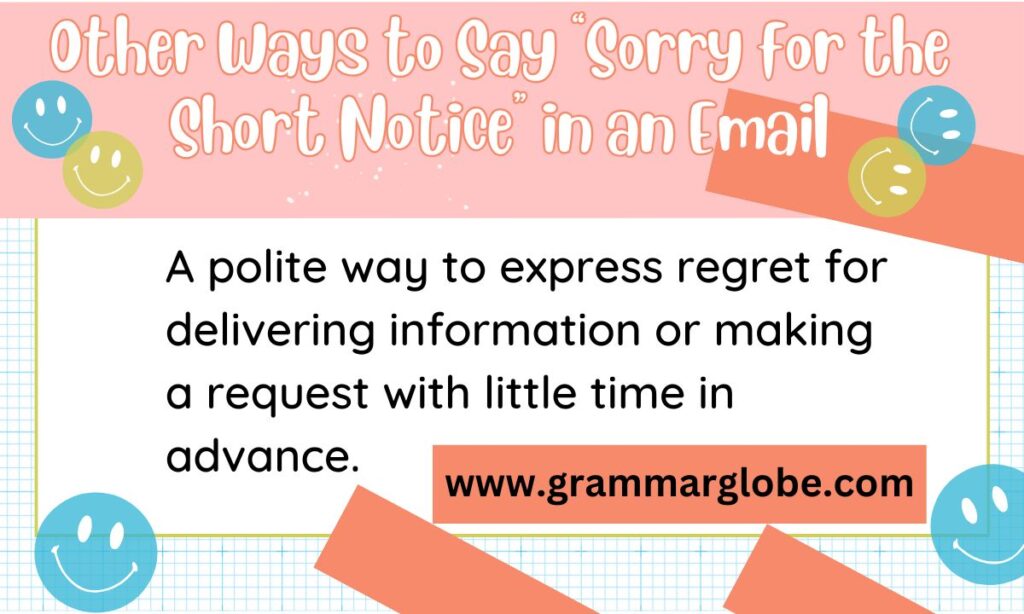In professional communication, there are moments when you need to send urgent updates or make last-minute changes. In these situations, it’s essential to balance politeness and professionalism while minimizing any inconvenience to the recipient. One commonly used phrase is “Sorry for the Short Notice in an Email”, but overusing this phrase can feel repetitive or insincere.
Sorry for the Short Notice” in an Email To maintain professionalism and show respect for your recipient’s time, it’s helpful to have a repertoire of polished alternatives. This guide offers 22 alternatives to express apologies for short notice, along with actionable tips to ensure your communication is effective and courteous.
Why It’s Important to Avoid Overusing “Sorry for the Short Notice”
When deadlines loom or last-minute changes occur, Sorry for the Short Notice” in an Email it’s tempting to rely on familiar phrases like “Sorry for the Short Notice.” However, apologetic language can lose its impact if overused. Here’s why:
- It can sound insincere: Using the same phrase repeatedly may make your email feel like a template rather than genuine communication.
- Missed opportunity for professionalism: Tailored phrases show thoughtfulness and respect for the recipient.
- Recipient acknowledgment matters: Acknowledging the inconvenience caused by last-minute changes and showing gratitude can foster goodwill.
Instead of simply apologizing, focus on email tone, time management, and balancing regret with appreciation for the recipient’s understanding and flexibility.
See Also: Walking Team Names (Funny, Creative & Meaningful Ideas)1. “I Apologize for the Last-Minute Notice”
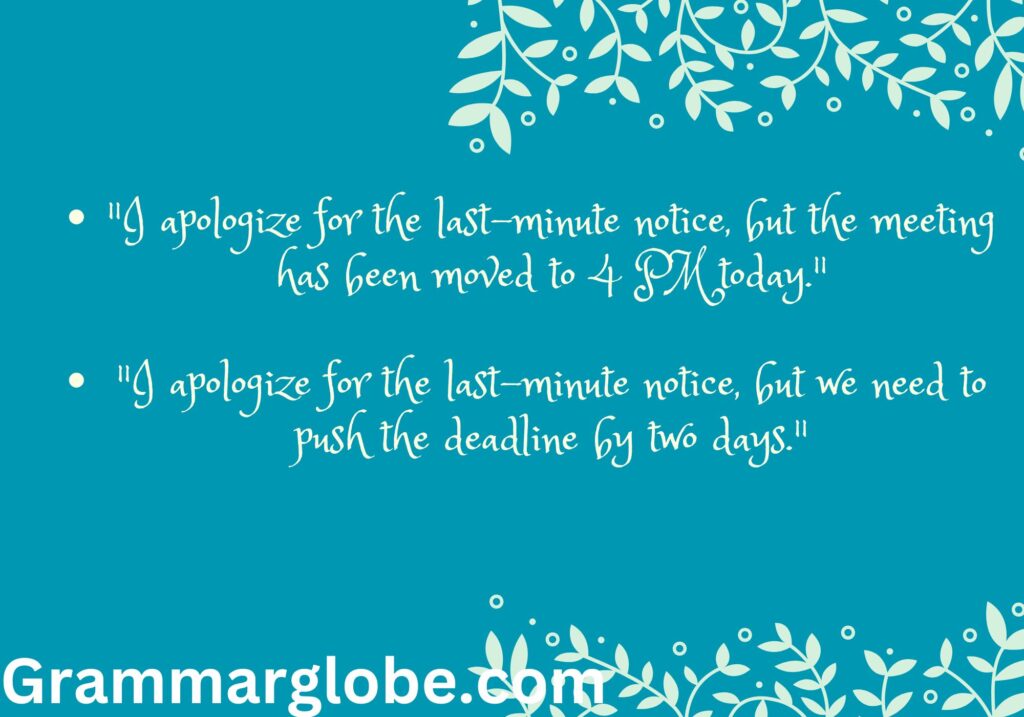
Definition:
A polite way to express regret for delivering information or making a request with little time in advance.
Scenario:
You need to reschedule a meeting at the last minute due to unforeseen circumstances.
Example 1:
“I apologize for the last-minute notice, but the meeting has been moved to 4 PM today.”
Example 2:
“I apologize for the last-minute notice, but we need to push the deadline by two days.”
2.”Please Excuse the Short Notice”
Definition:
A polite way to ask for forgiveness when delivering information with little prior warning.
Scenario:
You need to reschedule a meeting with a colleague at the last minute.
Example 1:
“Please excuse the short notice, but we need to move our meeting to tomorrow.”
Example 2:
“Please excuse the short notice, I have to cancel our lunch meeting today due to an urgent commitment.”
3. “I Regret the Short Notice”
Definition:
A polite way to express regret for informing someone on short notice, acknowledging the inconvenience caused.
Scenario:
You need to inform a team member about a last-minute meeting change.
Example 1:
“I regret the short notice, but the meeting has been moved to 3 PM today.”
Example 2:
“I regret the short notice, but I need the updated report by end of the day.”
See Also: Ways to Say “Have a Good Evening” Professionally4. “Sorry for the Urgent Notice”
Definition:
A polite way to apologize for delivering important information on short notice or with urgency.
Scenario:
Notifying a team member about a last-minute meeting or change in deadlines.
Example 1:
“Sorry for the urgent notice, but we need to move the presentation to tomorrow morning.”
Example 2:
“Sorry for the urgent notice, but the client requires feedback by the end of today.”
5. “Please Accept My Apologies for the Short Notice”
Definition:
A formal way to apologize for providing limited time or giving late notice.
Scenario:
You need to inform a client about a schedule change with limited time.
Example 1:
“Please accept my apologies for the short notice, but the meeting time has been moved to 4 PM.”
Example 2:
“Please accept my apologies for the short notice, I need your feedback on the report by tomorrow.”lease accept my apologies for the short notice, the deadline for the project has been moved up.”
6. “I Understand the Short Notice May Be Inconvenient”
Definition:
A phrase acknowledging that the recipient may find the timing difficult or disruptive.
Scenario:
Informing a team about a last-minute task with empathy for their schedules.
Example 1:
“I understand the short notice may be inconvenient, but I need the report by tomorrow.”
Example 2:
“I understand the short notice may be inconvenient, but could you attend the meeting this afternoon?”
See Also: Other Ways to Say “It Was a Pleasure Meeting You”7. “I Apologize for the Brief Notice”
Definition:
A polite way to apologize for giving little time or advance warning about something.
Scenario:
You need to inform a team about a sudden change in schedule with minimal lead time.
Example 1:
“I apologize for the brief notice, but the meeting has been moved to 3 PM today.”
Example 2:
“I apologize for the brief notice, but I need your feedback on the report by this afternoon.”
8. “My Apologies for the Hasty Notice”
Definition:
A polite way to apologize for sending a communication quickly or with little preparation.
Scenario:
You need to inform a team member of a sudden schedule change.
Example 1:
“My apologies for the hasty notice, but the meeting has been moved to 3 PM.”
Example 2:
“My apologies for the hasty notice, I need your feedback on this report by tomorrow.”
9. “I’m Sorry for the Late Notice”
Definition:
A phrase used to apologize for delivering information or making a request after a delay.
Scenario:
You inform a team member about a schedule change that was decided at the last minute.
Example 1:
“I’m sorry for the late notice, but the meeting has been moved to tomorrow.”
Example 2:
“I’m sorry for the late notice, but we need to submit the report by the end of the day.”
See Also: Types of Archetype & Their Examples10. “Forgive the Short Notice”
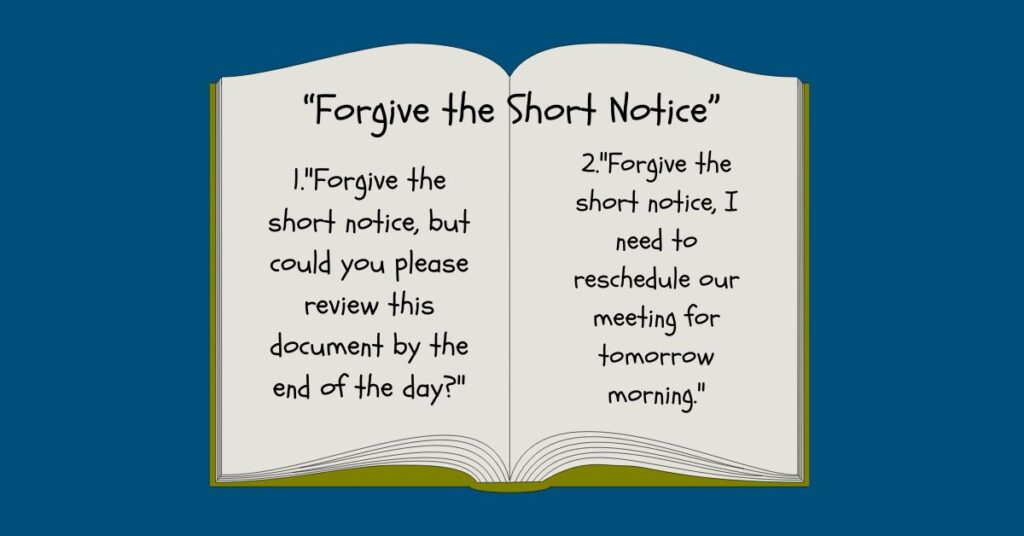
Definition:
A polite way of apologizing for sending a message with little advance warning.
Scenario:
You need to request something from a colleague or client but don’t have enough time to give prior notice.
Example 1:
“Forgive the short notice, but could you please review this document by the end of the day?”
Example 2:
“Forgive the short notice, I need to reschedule our meeting for tomorrow morning.”
11. “Sorry for the Inconvenience Caused by the Short Notice”
Definition:
A polite way to apologize for any trouble or disruption caused by giving little advance notice.
Scenario:
You need to inform a team member of a sudden schedule change that might affect their plans.
Example 1:
“Sorry for the inconvenience caused by the short notice, but the meeting time has been moved.”
Example 2:
“Sorry for the inconvenience caused by the short notice, but I need the report by the end of today.”
12. “I Regret the Lack of Advanced Notice”
Definition:
A polite apology expressing regret for not providing enough time before making a request or change.
Scenario:
You need to inform a team member about a sudden change in the project deadline.
Example 1:
“I regret the lack of advanced notice, but the project deadline has been moved up to tomorrow.”
Example 2:
“I regret the lack of advanced notice regarding the meeting schedule change.”
See Also: Other Ways to Say “Please Disregard My Previous Email”13. “I Apologize for the Rush”
Definition:
A phrase used to express regret for requiring quick action or response due to time constraints.
Scenario:
You ask a colleague to complete a task quickly because of a tight deadline.
Example 1:
“I apologize for the rush, but we need to submit the report by 3 PM today.”
Example 2:
“I apologize for the rush, I need your feedback on this document by the end of the day.”
14. “Please Forgive the Short Notice”
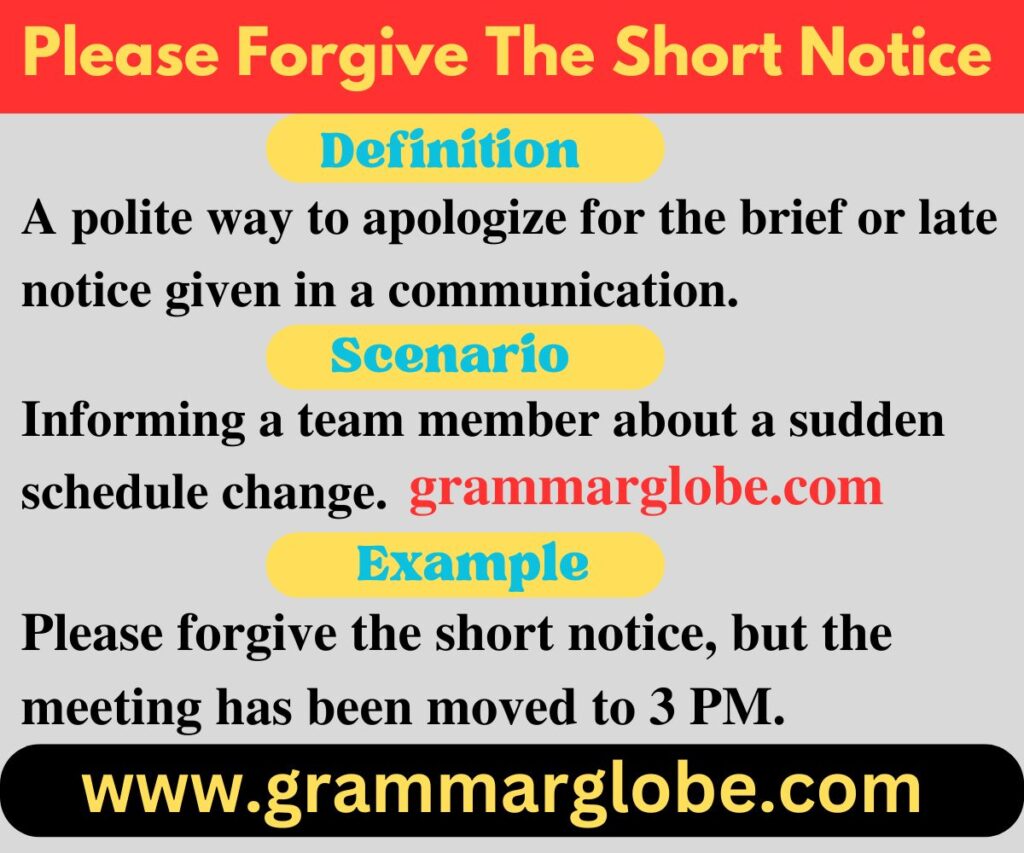
Definition:
A polite way to apologize for the brief or late notice given in a communication.
Scenario:
Informing a team member about a sudden schedule change.
Example 1:
“Please forgive the short notice, but the meeting has been moved to 3 PM.”
Example 2:
“Please forgive the short notice, I need your feedback on the draft by tomorrow morning.”
See Also: 199+ Elf Puns and Jokes to Spread Holiday Cheer and Laughter15. “Sorry for the Limited Time Frame”
Definition:
A phrase used to apologize for the short amount of time given to complete a task or meet a deadline.
Scenario:
You need to inform a team member that a deadline is approaching quickly and there isn’t much time to finish a project.
Example 1:
“Sorry for the limited time frame, but the report needs to be submitted by 3 PM today.”
Example 2:
“Sorry for the limited time frame, we need your feedback on the design by tomorrow morning.”
16. “I Apologize for the Short Lead Time”
Definition:
A polite way to apologize for giving someone insufficient time to complete a task or meet a deadline.
Scenario:
You need to inform a team member about a project deadline that’s closer than expected.
Example 1:
“I apologize for the short lead time, but we need the revised report by tomorrow.”
Example 2:
“I apologize for the short lead time, the client has requested the changes be completed by Friday.”
See Also: “Messege” or “Message”: The Correct Spelling and How to Avoid Errors17. “I Understand the Notice Was Brief”
Definition:
A phrase acknowledging that the recipient received little notice and expressing understanding of the situation.
Scenario:
You’re informing a colleague of a last-minute change in the schedule but recognize it’s short notice.
Example 1:
“I understand the notice was brief, but the meeting time has changed to 3 PM.”
Example 2:
“I understand the notice was brief, and I appreciate your flexibility in adjusting to this.”
18. “I Apologize for the Short Notice and Any Disruption”
Definition:
Apologizes for last-minute notice and any resulting inconvenience.
Scenario:
Notifying a colleague about a sudden schedule change.
Example 1:
“I apologize for the short notice and any disruption, but the meeting is now tomorrow.”
Example 2:
“I apologize for the short notice and any disruption, but the deadline has been moved to Friday.”
19. “Thank You for Your Understanding Despite the Short Notice”
Definition:
Expresses gratitude for someone’s patience with a last-minute request.
Scenario:
Thanking someone for being flexible with a sudden change.
Example 1:
“Thanks for your understanding despite the short notice on the meeting time change.”
Example 2:
“Appreciate your understanding despite the short notice on the report request.”
See Also: HY Meaning – A Guide to HY Definition & Uses in Text20. “Apologies for the Tight Timeframe”
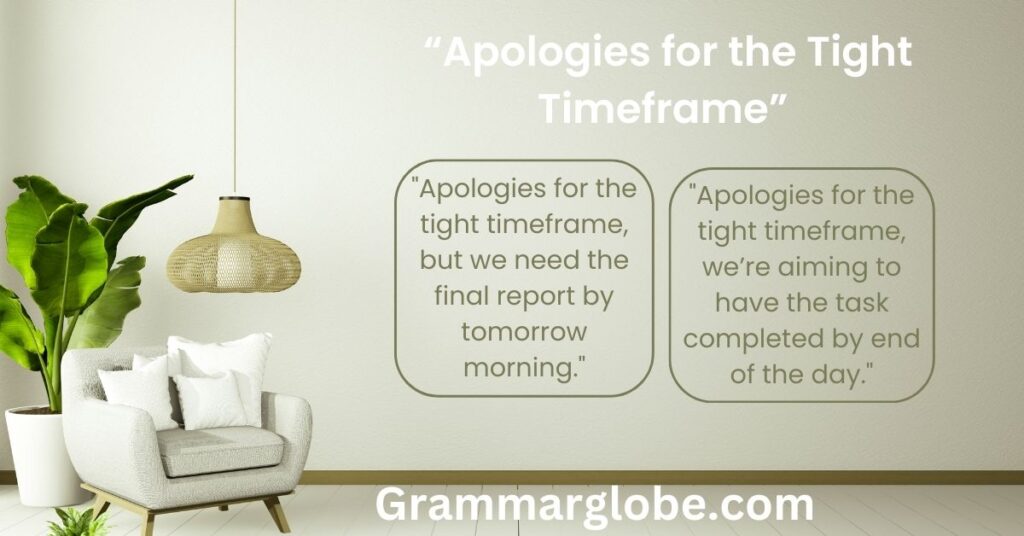
Definition:
A phrase used to apologize for a short deadline or tight schedule.
Scenario:
You’re informing a client that a project needs to be completed quickly.
Example 1:
“Apologies for the tight timeframe, but we need the final report by tomorrow morning.”
Example 2:
“Apologies for the tight timeframe, we’re aiming to have the task completed by end of the day.”
21.”Thanks for Your Quick Response on This”
Definition:
A phrase used to express appreciation for a prompt reply or action.
Scenario:
You are thanking someone for responding quickly to your request.
Example 1:
“Thanks for your quick response on this; I appreciate you getting back to me so fast.”
Example 2:
“Thanks for your quick response on this matter; it really helps us stay on track.”
22. “Apologies for the Lack of Advance Notice”
Definition:
An apology for not providing enough time or prior warning before a request or change.
Scenario:
You need to inform a client of a schedule change, but it’s last minute.
Example 1:
“Apologies for the lack of advance notice, but we need to reschedule our meeting for tomorrow.”
Example 2:
“Apologies for the lack of advance notice, the report deadline has been moved up to this afternoon.”
See Also: Class’ or Class’s? Understanding Possessives in EnglishFAQs
When should I use “Apologies for the Lack of Advance Notice”?
Use this phrase when you’re informing someone of a change or request with little prior warning, especially when it’s important or impacts their schedule.
Can I use “Apologies for the Lack of Advance Notice” in both formal and informal emails?
Yes, Sorry for the Short Notice” in an Email this phrase works well in both formal and informal contexts. However, adjust your tone based on the recipient.
How do I avoid sounding repetitive when apologizing for short notice in emails?
Use different apology phrases or focus Sorry for the Short Notice” in an Email more on expressing gratitude for the recipient’s understanding and flexibility, rather than over-apologizing.
What’s the best way to follow up after an apology for short notice?
After apologizing, offer a solution or next steps to show that you’re actively working to minimize any disruption caused by the short notice.
Is it better to explain why the notice is short or just apologize?
It’s best to briefly explain the reason for the short notice if relevant. This helps the recipient understand the situation better and feel more empathetic toward the change Sorry for the Short Notice” in an Email .
Conclusion
Sorry for the Short Notice” in an Email effective communication, even on short notice, requires balancing apology phrases, email tone, and gratitude. By using these 22 Other Ways to Say “Sorry for the Short Notice” in an Email, you can maintain professionalism, minimize disruptions, and strengthen relationships with recipients.
Next time you’re in a bind, refer to this guide to craft polite, tailored messages that leave a positive impression.
Remember, it’s not just about saying “Sorry for the Short Notice in an Email”—it’s about showing that you value their time and flexibility.

Jenni Maic is a creative wordsmith at Grammar Globe, where she brings humor and wit to the world of puns and English grammar. With a passion for playful language and a knack for simplifying grammar, Jenni’s articles make learning engaging and entertaining. Discover her work at https://grammarglobe.com/.

